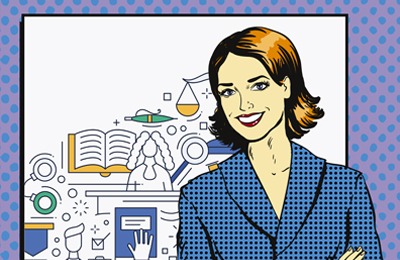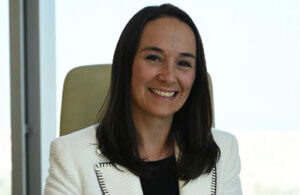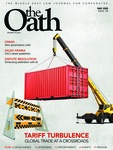Empowering female experts

Despite discouraging recent figures, a significant change in gender equality among expert witnesses is on the horizon. Clare Lavin of HKA shares her perspective on creating a level playing field for change for aspiring female experts.
For those of us in the disputes world who are committed to gender equality among expert witnesses, the latest figures may not look encouraging. Yet, I have never been more confident that a fundamental shift is already underway.
As a partner in the global HKA business providing expert services, and as an experienced practitioner in the Middle East, my perspective on the opportunities for women aspiring to the role of testifying expert witnesses is extremely positive.
But first, those statistics – courtesy of the annual survey of lawyers by the Equal Representation for Expert Witnesses Pledge[1]. Published earlier this year, the results showed that women were appointed or testified as the sole expert witness in just 9 per cent of the survey respondents’ cases in 2023. And that was a reduction on the year before (from 10 per cent).
This is not unexpected. Significant barriers remain – not least the tendency to appoint (and re-appoint) experts based on their prior experience – and the fact we have started from a low base point of female testifying experts in the first place. The ERE Pledge was conceived just three years ago (by Kathryn Britten and Isabel Santos Kunsman of Alix Partners) as a response to the stark fact that most lawyers had not seen any female expert testifiers or co-testifiers at all in the previous 12 months.
Other findings from the latest survey are more positive and corroborate my own recent experience. Female experts who have taken the stand and are named expert on cases are gaining more recognition for their expertise and contribution. The number of female experts appointed more than 20 times rose from 32 per cent to 36 per cent. There is also evidence that shortlists are becoming more gender-diverse meaning more lawyers are considering female experts. While 13 per cent still say that no women were considered for their cases, that is a welcome fall from 20 per cent in 2022.
There is a ready pipeline of female expertise as women lay the groundwork for their careers: 97 per cent of female respondents said they regularly drafted expert witness reports or played a major role in their preparation. The proportion aspiring to provide written or oral expert evidence for the first time rose to 88 per cent (up from 79 per cent in 2023). This is extremely encouraging to see.
Raising the profile of these up-and-coming women experts is therefore crucial to help them make that breakthrough. That is why at HKA we make a point of naming lead assistants in our expert reports and attaching their CVs. They won’t co-sign the report or be called to give evidence, but I want to lead on this and let people to know there are other competent and aspiring experts (male and female) behind my report. It is very much a team effort after all. No expert can do all the work for every case, though ultimately, we must formulate and stand behind every opinion in our reports. Crediting the contribution of your assistants helps get people’s names out there and I would encourage all firms to do this.
Getting that initial testifying experience is a challenge for every younger expert. Given that bar is somewhat higher for female experts, our idea is to profile them in videos so viewers can see our colleagues setting out their capabilities and begin to get to know the person and expertise behind a less familiar name.
Standard practice now in HKA proposals is to offer a choice of expert to the client. We will always put the right expert forward for the case, but by versioning proposals with senior and more junior experts we can provide a choice. Clients can decide if the emerging expert is suitable for their case.
Both sides can approach such an appointment with confidence. Our HKA policy is to put all experts through training for the APAEWE – the Advanced Professional Award in Expert Witness Evidence. This Master’s degree-level qualification really solidifies in-house training and experience – from critiquing of expert reports and the preparation of joint statements to honing cross-examination skills.
The ERE initiative is a sister pledge to the Equal Representation in Arbitration Pledge[2] (ERA), which has proved highly effective since its launch in 2015. Further, more than 1,580 individuals and 130 organisations across 50 countries have signed up the ERE Pledge – a 30 per cent increase over a year. HKA is a signatory, and I sit on both the ERE global steering committee and the ERA subcommittee for the Middle East.
I have seen more female experts emerging in the Middle East over recent years. Back in 2020, it was difficult for instructing lawyers to put together a diverse panel of experts. But like HKA, many firms have policies and targets for diversity and inclusion. This is encouraging more women to pursue this career path, while driving a change in attitudes and a greater willingness to consider and appoint female expert witnesses.
Yet, lawyers have told the ERE that they don’t know where to look for female talent. A directory of female experts will help meet that need, and this is another initiative for 2025 by the ERE Pledge. Women need that visibility – enabled by enlightened employers – but there also has to be buy-in from those who are procuring our services.
And barriers remain to be broken. There’s a grain of truth in the joke that clients associate grey hair with expertise and wisdom. Women experts tend to be younger, and they still face the risk aversion of instructing lawyers and residual bias – unconscious and conscious. The suggestion, by a survey respondent, that women may not be suitable for cases with tight deadlines due to their family obligations does not sit well with me. It is outdated. I believe this bias is fading with a ‘changing of the guard’, and growing recognition at all levels of the profession and business that men and women are all real people trying to be present for their families while fully committed to their work and their careers.
I can see those female expert witnesses of the future coming through, and I’m excited by the prospect. As one advocate of gender parity memorably put it to me once, women expert witnesses are no longer pushing at a closed door, but walking through, leaving it open for others to follow. The opportunity is there. There’s actually never been a better time for women in our field to seize that opportunity.
Text by:

Clare Lavin, partner, HKA
—
Footnotes:

























































































































